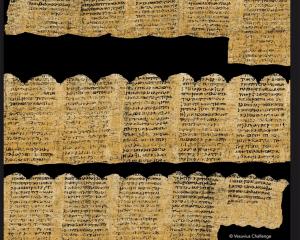Apartheid, animosity, outrage ... the 1981 Springbok tour to New Zealand still stirs strong memories. Shane Gilchrist discusses positions with former Otago rugby coach Lee Smith.
Opposed to the tour, yet with a sense of responsibility to a side he had taken over the previous year, Mr Smith admits to feeling torn at the time.
"Really, being a fairly liberal person from a teaching background (Mr Smith was then a 35-year-old teacher at Bayfield High School), I was against the tour, as were a lot of teachers, who withdrew their services from rugby.
"I had a responsibility to the team so the only stand I made - which is pretty pathetic I suppose - was a policy to deal with the team and nothing else," recalls Mr Smith, who arrived with the team at Carisbrook and left immediately after the game.
Mr Smith's stance had become public knowledge a good month before the Otago-Springboks match. In a front-page article in the Otago Daily Times, in relation to an anti-tour rally planned for July 3 in Dunedin, his opposition was affirmed in newsprint.
He had also been contacted by a reporter from the now-defunct tabloid Truth who, claiming to have rung other coaches in New Zealand to ask what stand they had taken, elicited a response from Mr Smith.
"In fact, I think I was the only one who answered the question.
"The players knew of my opposition. But the Otago management didn't. John Dowling (deputy chairman of the Otago Rugby Union at the time) rang me up to say, 'oh, you've made this stand then? Well, that's OK'. Really, I got no flak from the Otago union and it didn't affect my appointment the following year, either."
The Springboks might not have arrived in New Zealand until July 19, 1981, but public debate and demonstrations had been brewing for months, if not years.
In 1973, Norman Kirk's Labour Government directed the New Zealand Rugby Union to not invite the Springboks to tour following decades of reciprocal tours, for which the union had adopted a policy of not selecting Maori players in sides visiting South Africa (a notable example being fullback George Nepia's exclusion from the 1928 All Blacks touring team).
However, the National Party's election victory in 1975 facilitated a tour to South Africa the following year. The repercussions were widespread, 28 African states boycotting the 1976 Montreal Olympic Games because of the International Olympic Committee's refusal to ban New Zealand from the event.
Come 1981, divisions within New Zealand in regards to rugby relationships with South Africa were widening.
According to a New Zealand Herald poll carried out between July 25 and 30, 1981, that asked, "Should a Springbok rugby team have come to New Zealand?", 42% were in favour, 49% were opposed and 9% did not know. In Dunedin those figures were 27%, 68% and 5%, respectively.
That split even found its way into the All Blacks, with captain Graham Mourie and centre Bruce Robertson opposing the tour, as did Gary Seear, who also refused to front for Otago, a move which gave his coach a few headaches.
"He was the All Black No 8," Mr Smith recalled from his North Auckland home this week.
"We were a bunch of ponies, really, and he was the tallest player we had, so it affected our lineout play."
Despite the blocking of the Southern Motorway by about 500 protesters (according to ODT estimates at the time; others put that figure even higher) and attempts by a smaller group of people who infiltrated Carisbrook and blew whistles before being ejected by police, the Otago-South Africa game was largely unaffected.
"The interesting thing for me on the day was the tension surrounding the tour meant we performed beyond ourselves. I think the military and police who accompanied us to the game raised the tension," Mr Smith says. "The guys thought, 'what the hell are we going into?'
"A number of our players had connections to the Maori community, so I think they looked on the game as a way to show the South Africans that even a small area like Otago could bond and perform well.
"It was incredible. We'd said that at the kick-off our players were to saw off at the ankles the first opposition player who got the ball. Well, I think the biggest player in their team took the ball and Ken Bloxham took his legs away. That started the whole game. The match went in a flash. We probably played as well that day as we ever did.
"I think we would have won the game if not for a penalty shot which ultimately gave South Africa the victory. The ball hit the flag on the upright and dropped down next to the goalpost, and the South African captain was in the best position to catch it. He scored and they converted it. Without that, we could have won the game."
Now the International Rugby Board's regional development manager for the Oceania region, Mr Smith recalls it took years for some to enjoy rugby again.
"It took a long time for that sourness to go. I moved from Dunedin to Wellington in 1986 and even then teachers weren't taking rugby in schools - well, not the one I was at. The local club was having to provide coaches.
"I really think that if we hadn't won the 1987 World Cup, the 1981 tour would have had a long-term detrimental effect on rugby in this country. That World Cup win unified the country once again behind the game."
Though South Africa's apartheid laws were repealed a decade later - in 1991 - Mr Smith believes it is important New Zealanders remember the events of that 1981 tour.
"I think it was good to show a country like South Africa how people can get on and live together. We are a good example - though we are not perfect - of race relations.
"I remember [former New Zealand netballer] Waimarama Taumaunu being asked about race relations some years ago. She said you don't need to worry about that; they'll be solved in the bedrooms of the country.
"I always remember that. Look at your own family: there will be different ethnicities within it."












